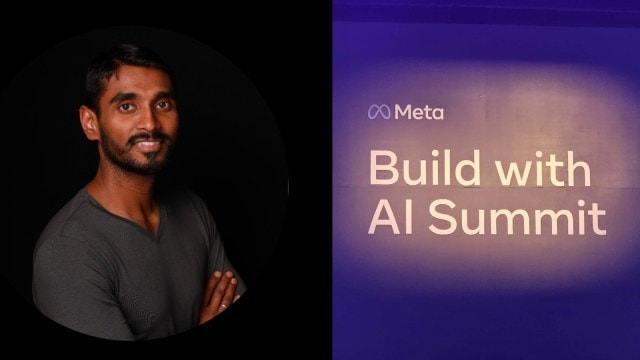Trying to bring high-quality Indian language tokens into Llama so that Meta AI will work in Indian languages: VP Manohar Paluri
Meta AI is easily accessible to users and developers when compared to other LLMs.
 Manohar Paluri, vice president of AI at Meta (Express Photo)
Manohar Paluri, vice president of AI at Meta (Express Photo)Meta AI has a monthly active user base of over 500 million across the world, and it is all set to become the world’s most-used AI chatbot by the end of 2024. This is because of its accessibility, as users can access Meta AI on apps that are already present on their smartphones. Llama is also an open-source large language model (LLM), which makes it developer-friendly.
In a media roundtable at the company’s first Meta Build with AI Summit in India, Manohar Paluri, vice president of AI at Meta, hinted at the fast-paced rollout of Meta AI. The company has delivered five major models in just two years, and each generation of Llama has delivered a major leap in performance and functionality.
Paluri stated, “We are actually trying to bring high-quality Indian tokens into Llama so that Llama will work in Indian languages. Llama being the engine for Meta AI, Meta AI will work in Indian languages, where billions of people or all the people in India who are using Meta AI on WhatsApp, Facebook, and Instagram will benefit from it.”
“While safety for large language models is often addressed in English, there is additional work involved, especially while adding a language to ensure safety. This includes ensuring the token representation of the language is good, that the pre-trained data of the language looks good and maps across languages, and then aligning the model to ensure the input cards are tuned for the languages,” Paluri said.
Apart from English, Meta AI currently only supports Hindi, and the company stated that the additional fine-tuning of all the different Indian languages will be for future models.
Meta has also partnered with companies like Sarvam, which has resulted in the creation of models like Indic Llama, a model trained in Indian languages. This is another result of Meta AI’s open-source nature. This also enables developers to build their own custom large language models based on Llama, where Meta is not necessarily involved.
Meta’s vice president and chief AI scientist Yann LeCun also stressed the importance of being open and India’s role in shaping the future of AI. LeCun also highlighted India’s potential to shape the future of AI globally.







